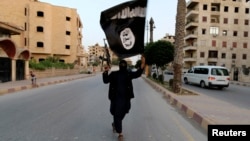One direct byproduct of the rapid advancement of militants from the Islamic State of Iraq and the Levant (ISIL) in Iraq is a revamped U.S. policy in Syria.
Last week, President Obama asked Congress to authorize $500 billion in direct assistance to train and equip what it calls "appropriately vetted elements of the moderate Syrian armed opposition."
That's a dramatic turnaround for Obama, who has tried to keep his distance from the civil war in Syria, which has become more complex and deadly – including the use of chemical weapons against civilians in Syria.
So, why now?
"The ISIS [ISIL] stampede into Iraq has, I think, concentrated the minds of the president and policy makers in the administration, and perhaps made them realize that our current policy in Syria isn't working," says Michael Crowley, Chief Foreign Affairs Correspondent for TIME.
In its authorization request, the White House cited “growing spillover effects of the Syrian conflict” among its reasons for aiding some Syrian rebels. ISIL militants are headquartered in the northern Syrian city of Allepo.
Just under two years ago, in late 2012, says Crowley, Obama was presented a plan supported by Hillary Clinton, Leon Panetta and David Petraeus to step up training and arming of the rebels in Syria.
While not embracing that proposal, the president has signed off on doing more to bolster acceptable elements of the Syrian opposition very gradually. That reportedly includes supplying rebels with heavy anti-tank weapons and a Central Intelligence Agency program to train a small number of rebels every month in Jordan.
But the new request from Congress is a long way from Obama's "red line" moment, when Assad unleashed nerve gas in 2013, exactly one year after the president warned of serious consequences.
No air strikes were launched.
Crowley points out that just two years after direct training of Syrian rebels was raised, the equation in Syria is a lot of more complicated, casting doubt on how effective a dramatically bolstered training effort might be.
"We're [the United States] more interested in seeing the rebels fight the Islamists than we are in seeing them defeating Assad. It's a real three-dimensional chess game right now," he said.




